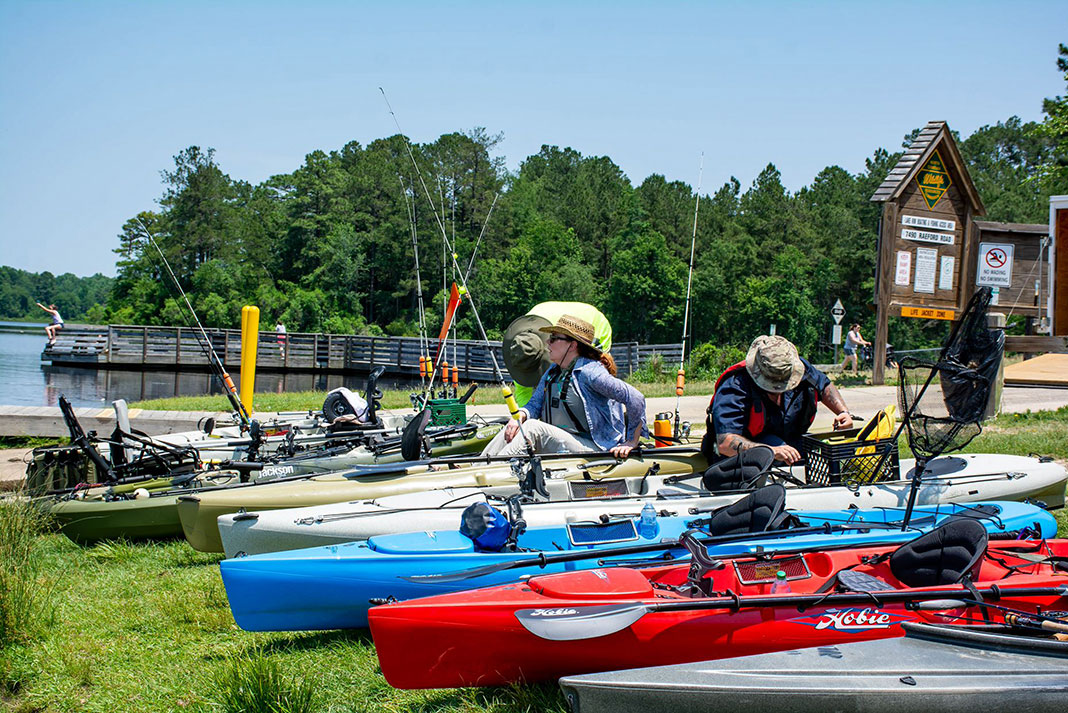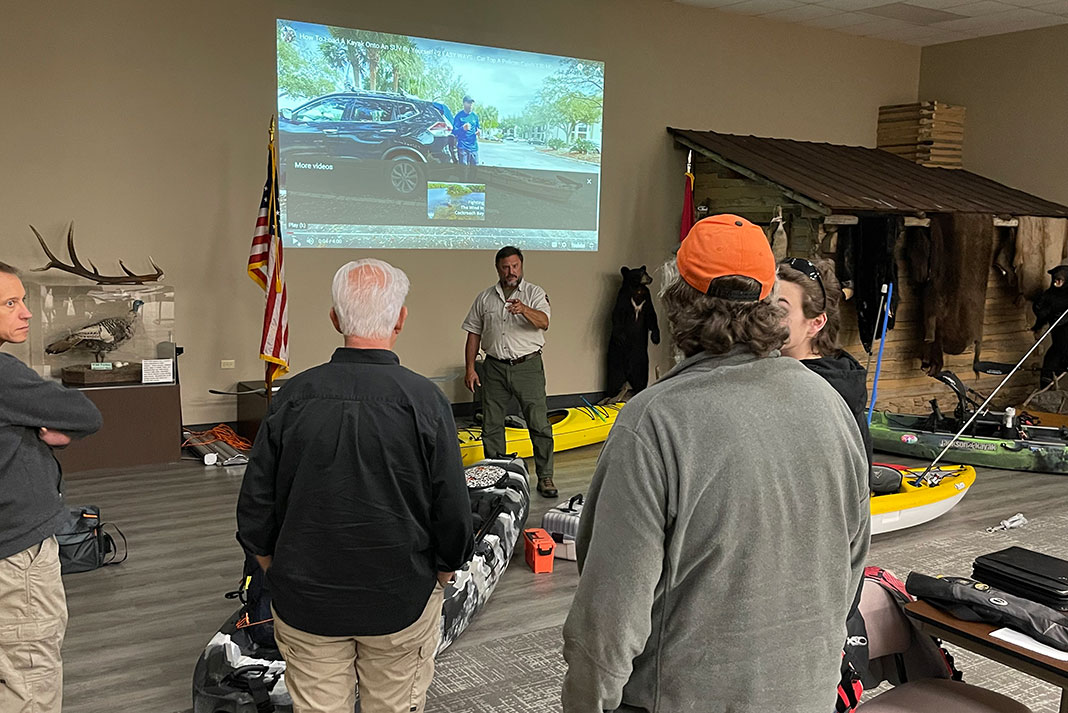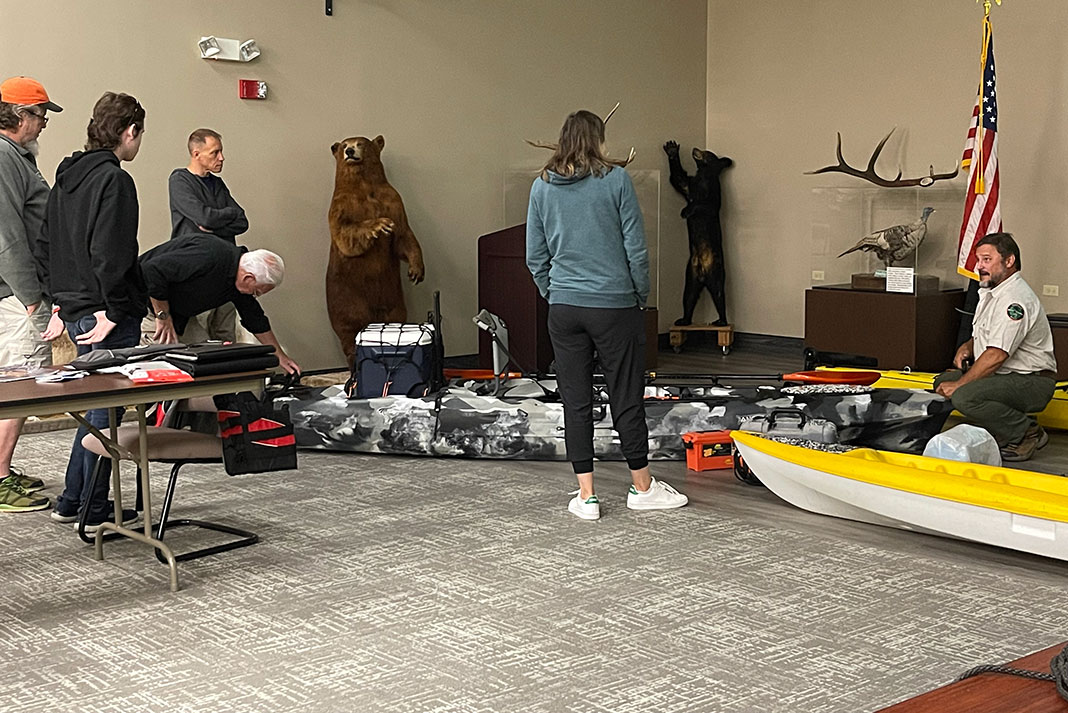Products You May Like
When I read the article on the Fishing Wire, I knew I had to learn more. The headline said: “Canoe and Kayak Fishing Introduction Course.” The first sentence of the press release invited interested anglers to attend a two-day, hands-on kayak fishing course hosted by the Tennessee Wildlife Resource Agency (TWRA). Sign me up.
Unfortunately, I don’t live in Eastern Tennessee. But the press release got me wondering, are similar programs offered in other states? How does a course start? Where could I have learned to kayak fish?
Kayak Fishing 101: State Courses On Paddling, Casting & More
Where do I start?
I started with the email address listed at the bottom of the TWRA press release. Mike Prater is a wildlife technician with the agency and the co-coordinator of the Introduction to Kayak and Canoe Fishing program.
“I grew up in canoes and only recently got into kayak fishing,” Prater says. He joined the recent surge of kayak anglers hitting the water, and quickly realized the need for research-based angler education.

Prater’s background in search and rescue and his current position working with the public pointed out one thing: “People are making poor choices.” He observed kayak anglers not wearing life vests, moving too close to strainers and overhead trees, running rapids and having conflicts with powerboaters. “It is pretty obvious the level of experience and expertise is not there,” he says.
Recent statistics from the U.S. Coast Guard indicate kayaks are now the third most common watercraft involved in on-the-water deaths. The same report shows that in 83 percent of kayak fatalities the operator was not wearing a life vest. Prater’s observations supported the numbers “Life vests are the number one avoidable contributor,” he points out.
The statistics are compounded in Tennessee where the population has surged in the past few years. “Almost one million people have moved to Tennessee in the last 18 months and they are like a kid in a candy shop,” Prater says. He explains people move to the country looking for good, clean living, but they don’t understand the risks involved in kayak fishing.
What is a Kayak Fishing Education Program?
Once Mike Prater saw the need, he started looking for a solution. As a wildlife technician, outdoor education isn’t his department. But, he works for the state agency, so he knows the right people.
Prater teamed up with Leigh Willard, a volunteer with TWRA and an ACA-certified instructor. Prater handled the safety and fishing side while Willard covered paddling. In two months, they developed a curriculum and materials to teach canoe and kayak fishing skills. A month later, they held their first session with 30 anglers.
The program runs for two days. Day one is in the classroom and the second part is on the water. In the first eight-hour session, anglers learn everything from the rules of the road to kayak rigging and basic fishing skills. “At the end of the day we have practical exercises like knot tying and casting practice,” Prater says.
The second day, the class heads out to a local lake. “We start with basic paddle strokes and techniques, then we go fishing,” Prater says. He’s noticed most of the participants have more fishing experience than paddling experience. Prater laughs, “They quickly realize fishing from a kayak is different.”
If You Build It…
A week after the first program, Prater’s phone was ringing off the hook. “We got calls from local fishing clubs, 4-H programs, paddling clubs,” he says. One call was from the American Canoe Association director who was interested in collaborating with their kayak fishing skills courses. Prater says, “We need to work on a national standard for kayak fishing education.”
The Tennessee program was off to a great start before Covid-19 put on the brakes. “I was reassigned and the program was moved online,” Prater says. Now that the pandemic is under control, the program has resumed. Prater has big plans. “I’d like to schedule a program every month from March to October,” he says. Working with partners in other parts of the state, he hopes to duplicate the program.
Prater envisions the program morphing into a professionally developed curriculum like hunter and boater safety education. “It’s amazing how many people are interested in the program,” he says.
The biggest limitation is the number of participants. The program is held to 10 anglers for each instructor. A typical class has 30 students. With hundreds of new kayak anglers hitting the water, the program will have to grow to meet the need. Prater and the team are already planning to train more instructors. “I’m pushing to get as many Wildlife Agency folks as possible to get certified as instructors,” he says.
What is the Value?
Anyone who knows anything knows the government doesn’t do anything without a tangible value for the people. Besides teaching people how to fish from a canoe or kayak, what was the value of the education program?
Mike Prater says the primary value is improving boater and angler safety and reducing accidents. After years on the water working with the public, the wildlife tech has horror stories to support his point. He shares recent incidents of motorboaters waking paddlers. “Educating kayak anglers reduces the risk of these incidents.”
And kayak fishing education has an economic value, too. More anglers on Tennessee lakes, ponds and rivers means more fishing licenses and more money for wildlife programs and facilities. Prater says their program plays into the State’s 3R initiative to recruit, retain and reignite more citizens in the outdoors. Prater chuckles, “The bosses are happy.”
Are There Other Kayak Fishing Education Programs?
After talking to Prater about the Tennessee classes, I was anxious to find other state-run kayak fishing education programs. A search on Google resulted in programs in two other states: Pennsylvania and North Carolina.
I reached out to Pennsylvania Fish and Boat Commission (PFBC) with my list of questions and received a quick response from Outreach and Education Coordinator Chad Foster. His story was similar to Mike Prater’s in Tennessee. Foster says, “I am big into fishing local tournaments and several other PFBC staff are kayak anglers, so in 2015 we held two introduction to kayak fishing courses.”
Just like in Tennessee, the PA program caught on like wildfire. The following years, Foster and company increased the number of programs. Through the Covid pandemic, the instruction went virtual. “We were able to reach more participants,” Foster says.
Limited participation is still the biggest challenge. “The programs are very labor intensive,” Foster admits. The face-to-face sessions are limited to 15 participants and they can only produce three or four events per year. “I hope to kick that up to 10 events each year,” Foster says.
Still, the trickle-down effect spreads the program’s influence beyond the participants.
In North Carolina, the kayak fishing education program is part of the Pechmann Fishing Education Center in Fayetteville. Gerald Klauss is education specialist in charge of the program. My first question was how my state can start a fishing education center. Recreational and commercial fishing are huge industries in North Carolina and the state has a commitment to introduce, educate and retain anglers.
Again, the North Carolina program came from within the state wildlife organization. Klauss says the first kayak fishing education efforts were part of the larger Fish and Float Days event. “Since kayak fishing is growing so fast, we decided to add in-house programs several times per year,” he says.
Klauss’ program is also hugely popular, even if the reach has been limited to the number of participants the facility and the materials can accommodate. “I would like to introduce more sites for the program and develop partnerships to give more people access to kayak fishing,” Klauss says.
The program not only educates new anglers and helps retain current ones, but it also expands the participant’s interest in the outdoors. “We have a lot of participants who return to take other fishing and hunting courses,” Klauss says.
How Does My State Geta Kayak Fishing Education Program?
One thing all three programs have in common is a dedicated kayak angler at the center of the initiative. It takes an enthusiast within the state wildlife organization to get things rolling. In Tennessee, Mike Prater and Leigh Willard volunteer their time to the program while it is still gaining traction. In Pennsylvania, Chad Foster and staff are established kayak anglers looking to use their platform to share their passion. North Carolina has a fishing education center staffed with professionals committed to introducing new anglers and retaining existing anglers.
As more kayak anglers enter the water, state agencies will have to recognize the need for education. More anglers on the water pay back with more license and permit money to fund wildlife services and access. “It’s a win-win for everyone involved,” North Carolina’s Gerald Klauss says.
Public education for kayak anglers, state-run programs teach skills and safety. | Feature photo: Courtesy NC Wildlife Resource Commission



